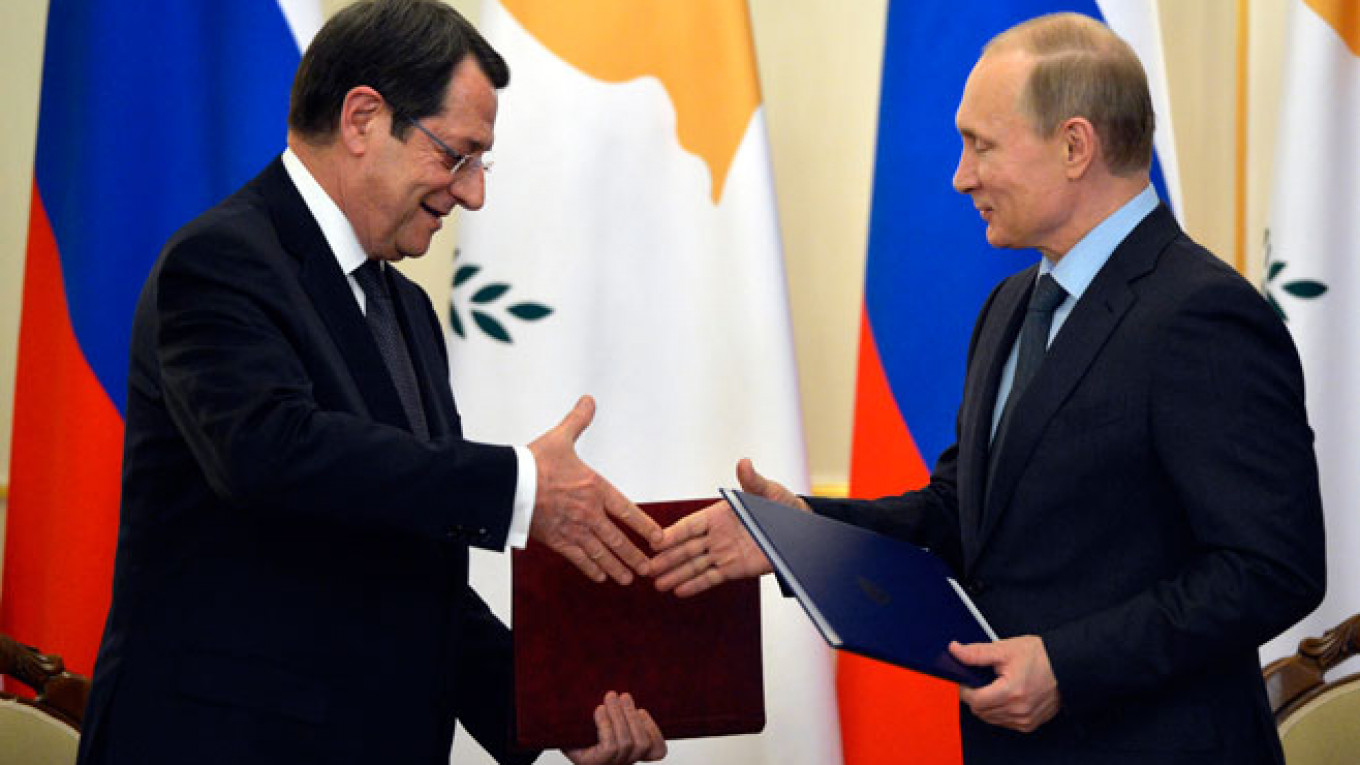Last week, Cypriot President Nicos Anastasiades visited Moscow to promote trade and bilateral ties with Russia. The two countries signed a range of agreements, from the much-publicized military cooperation deal that gives the Russian navy access to Cypriot ports, to a memorandum of understanding between the Russian and Cypriot foreign direct investment agencies.
Other documents signed set out plans for cooperation in science and technology, education and business, and highlight the opportunities and appetite for closer ties between Moscow and Nicosia.
In the meantime, the future of Greece continues to dominate headlines. Although a last-minute compromise with euro zone finance ministers was reached, this safety net — if it is approved by individual EU states — will be in place for just four months and Greece still faces an uphill struggle to devise and implement a set of economic reforms that would satisfy its international creditors.
The economy in Cyprus, which is still recovering after a crippling banking crisis, is closely linked to that of Greece and will be heavily affected by any "Grexit" from the euro or from the EU itself. One point that has been overlooked by many commentators is the very real repercussions that trouble in Greece and Cyprus will have for Russia.
On the face of it, recent events in the region are a political opportunity for Russia. The new Syriza government in Greece has spoken out against EU sanctions against Russia. These are seen as hurting the Greek tourism industry — more than one million Russian tourists visited Greece every year before the recent ruble devaluation — and Greek agricultural exports, among other things.
The new Greek Prime Minister Alexis Tsipras has been vocal about the potential for Cyprus and Greece to form a bridge between Russia and the EU.
On the eve of his visit to Moscow, Cypriot President Nicos Anastasiades also spoke about his opposition to sanctions and their impact on smaller EU members.
Talk about Greece leaving NATO and the possibility of Russian military bases on Cyprus — though already dismissed by the Cypriot government — raises the tension up a notch or two further.
However, there is a danger of overstating the positives here for Russia. Despite Cyprus's economic scare of 2012-13, which arguably was caused by financial turmoil in Greece to a large extent, the country is still one of the key destinations for Russian money.
The exposure of the Cypriot economy to Greece is no secret, so revived fears of a Grexit will be a genuine concern. A repeat of the banking crisis could be the beginning of the end for Cyprus as an offshore destination for Russian businesses.
Russian Finance Minister Anton Siluanov said in January that he would not rule out offering financial support to Greece. Yet given the economic woes in Russia at the moment, this looks unlikely to occur any time soon.
At the same time, the Russian government is already actively pursuing its policies of "deoffshorization" and repatriation of Russian money and tax receipts and this does not sit well with the historic trend for Cypriot offshore structures for Russian companies. On a wider level, the knock-on negative effects to the Russian economy of a Grexit would in all likelihood be severe.
It is an economy already under pressure from the fall in oil prices and Western sanctions and another "Lehman-type" event across European and then global markets is the last thing that beleaguered Russian businesses need right now.
Political relations might be rock bottom, but the EU as a trading block remains Russia's biggest trading partner by some distance and Russia would not be immune to any upheaval in Greece by any means.
Ian Ivory is a corporate finance specialist and partner at Goltsblat BLP.
A Message from The Moscow Times:
Dear readers,
We are facing unprecedented challenges. Russia's Prosecutor General's Office has designated The Moscow Times as an "undesirable" organization, criminalizing our work and putting our staff at risk of prosecution. This follows our earlier unjust labeling as a "foreign agent."
These actions are direct attempts to silence independent journalism in Russia. The authorities claim our work "discredits the decisions of the Russian leadership." We see things differently: we strive to provide accurate, unbiased reporting on Russia.
We, the journalists of The Moscow Times, refuse to be silenced. But to continue our work, we need your help.
Your support, no matter how small, makes a world of difference. If you can, please support us monthly starting from just $2. It's quick to set up, and every contribution makes a significant impact.
By supporting The Moscow Times, you're defending open, independent journalism in the face of repression. Thank you for standing with us.
Remind me later.






